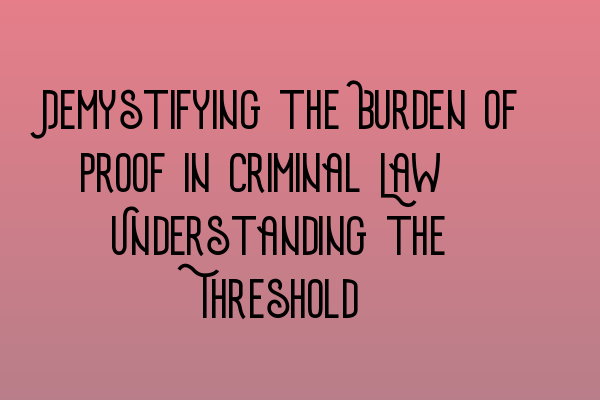Demystifying the Burden of Proof in Criminal Law: Understanding the Threshold
The burden of proof is a fundamental concept in criminal law that determines who must establish the facts in court proceedings. It is a critical element that ensures fairness and protects the rights of individuals involved in a criminal case. Understanding the burden of proof and its threshold is essential for anyone studying or practicing criminal law in the UK.
What is the Burden of Proof?
The burden of proof refers to the responsibility placed on the prosecution to prove the guilt of the defendant beyond a reasonable doubt. In criminal law, the burden lies with the prosecution, primarily because the defendant is presumed innocent until proven guilty. This principle is a cornerstone of the UK legal system and is vital in safeguarding individual rights.
In criminal cases, the prosecution must present evidence that proves the guilt of the defendant beyond a reasonable doubt. Reasonable doubt is a standard that requires the evidence to be so convincing that an ordinary person would have no hesitation in accepting it as true. It is both a subjective and objective test that ensures a fair and just outcome.
The Threshold of Proof
The threshold of proof in criminal law is the level of certainty required to meet the burden of proof and secure a conviction. The standard is set at “beyond a reasonable doubt,” which is the highest burden of proof in the legal system. It signifies that the prosecution must produce evidence that leaves no reasonable doubt in the minds of the jury or judge about the defendant’s guilt.
This high threshold is intentionally strict to protect individuals from wrongful convictions. It acknowledges that it is far worse to convict an innocent person than to let a guilty person go free. As a result, the prosecution must present a strong and compelling case, supported by significant evidence, to meet this demanding standard.
The Role of the Defense
The burden of proof may rest with the prosecution, but this does not mean that the defense has no role to play. The defense plays a critical role in challenging the prosecution’s evidence and creating reasonable doubt. By presenting alternative theories or evidence, the defense aims to cast doubt on the prosecution’s case and raise questions that leave room for uncertainty.
Throughout the trial, the defense can cross-examine witnesses, present their own evidence, and make arguments to undermine the prosecution’s case. Their goal is to introduce enough doubt in the minds of the jury or judge to prevent the burden of proof from being met.
Conclusion
Understanding the burden of proof and its threshold in criminal law is vital for both aspiring solicitors and practicing lawyers. It is a concept that ensures fairness and protects the rights of individuals involved in criminal cases. The burden lies with the prosecution, and they must present evidence that proves the guilt of the defendant beyond a reasonable doubt. This high threshold acts as a safeguard against wrongful convictions and emphasizes the importance of a strong and compelling case. The defense also plays a crucial role in challenging the prosecution’s evidence and raising reasonable doubt.
To learn more about criminal law and preparation for the SQE exams, consider checking out our related articles:
- SQE 1 Practice Exam Questions
- SQE 1 Practice Mocks FLK1 FLK2
- SQE 2 Preparation Courses
- SQE 1 Preparation Courses
- SRA SQE Exam Dates
